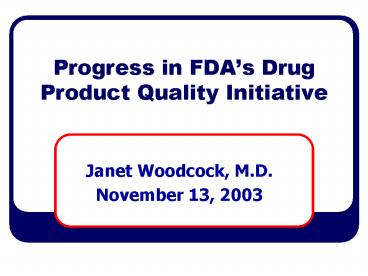Progress in FDA PowerPoint PPT Presentation
Title: Progress in FDA
1
Progress in FDAs Drug Product Quality Initiative
- Janet Woodcock, M.D.
- November 13, 2003
2
Impetus for Initiative
- Modernization and continuous improvement in
pharmaceutical manufacturing sector slow compared
to other sectors - Process efficiency low Drives up costs
- Regulatory paradigm (cGMPs) not significantly
changed over 25 years - Regulators recognize need for risk-based
approaches
3
Structure of Initiative
- All pharmaceutical products drugs, biologics,
veterinary drugs - Cross Center ORA, CDER, CBER, CVM
- Inspection and Review All aspects of quality
regulations
4
Common Goal of Stakeholders
- Reliable availability of high quality,
efficiently produced drugs
5
Objectives of Initiative
- Encourage adoption by the pharmaceutical industry
of new technological advances in manufacturing - Facilitate industry application of modern quality
management techniques to all aspects of
pharmaceutical production quality assurance - Encourage implementation of risk-based approaches
that focus both on industry and Agency attention
on critical areas
6
Objectives
- Insure that regulatory review and inspection
policies are based on state-of-the-art
pharmaceutical science - Implement quality management in review and
inspection processes
7
Plan for Initiative
- Two year project
- Constitute 16 working groups
- Implement immediate (6 month) and 1 year actions
- Final actions at 2 year mark
8
Six Month Time point February 20, 20003
- Plans for pharmaceutical inspectorate
- Center review of warning letters
- Modifications to form 483
- Draft guidance Part 11
9
Six Month Time point
- Draft guidance on comparability protocols
- Announcement of plan for dispute resolution
process - Progress on PAT initiative
10
- Second Progress Report
- September 3, 2003
11
First Year Accomplishments
- Issued draft guidances on comparability protocols
for small molecules and proteins - Workshop (with PQRI) April 22, 2003
- Issued final guidance on Part 11, Electronic
Records, Electronic SignaturesScope and
Application- clarifies the scope and application
of the Part 11 regulation and provides for
enforcement discretion in certain areas
12
First Year Accomplishments (continued)
- Implementation of a technical dispute resolution
process for CGMP disputes- draft guidance issued
and initiation of a 12-month domestic pilot
program in early 2004 - FDA actively seeking to improve international
standards for drugs through its efforts at
supporting global harmonization, and
collaboration with its public health counterparts
in other nations
13
First Year Accomplishments continued
- Issued draft guidance on PATA Framework for
Innovative Pharmaceutical Manufacturing and
Quality Assurance- intended to encourage
pharmaceutical manufacturing and QA technologies - Issued draft guidance on Sterile Drug Products
Produced by Aseptic Processing- emphasizes
current science and risk-based approaches, once
final, this will replace the 1987 Guideline
14
First Year Accomplishments continued
- Changes to FDAs inspection program
- -Establishment of a Pharmaceutical Inspectorate-
highly trained individuals within ORA who will
devote most of their time to conducting human
drug manufacturing quality inspections on
prescription drug manufacturers and other complex
or high risk inspections. - -The Preapproval Inspection Compliance Program
has been revised to give the field more
opportunity to utilize a risk-based approach by
allowing greater flexibility in determining
whether a preapproval inspection is warranted.
15
First Year Accomplishments continued
- FDA entered into several collaborations with
industry, academia, and another government
organization- will aid in enhancing FDAs
scientific and technical capabilities, as well as
help both FDA and industry to better focus
activities and resources related to
pharmaceutical product quality.
16
Next Steps Topics for further consideration
- Develop definition of quality for a
pharmaceutical - Customers point of view?
- Fitness for use?
- Availability?
- Definition of risks to quality
- Draws on underlying science
- Requires a model for risk
17
Next Steps Quality Systems
- Internal FDA Drug Quality Regulatory Program as
a Quality System - Does the program operate in a coordinated
fashion, as a system? - To what extent can the principles of quality
management be applied to the operations of the
program?
18
Next Steps Quality Systems
- External
- To what extent do the existing regulations and
guidances reflect current thinking on quality
management practices? - To what extend do current standards (CMC and
cGMP) reflect current thinking on quality
management?
19
Next Steps Quality Systems
- External
- To what extent do these standards
promote/facilitate state-of-the-art quality
management practices in industry? - To what extent, if any, do these standards impede
industry?
20
Next Steps Sources of Variability
- What does design controls mean for
pharmaceuticals? - What is the role of process validation?
- Need scientific evaluation of our conceptual
understanding of the sources of variability
during manufacturing
21
Next Steps Role of Review Process
- What is the objective of the CMC review?
- To what extent does the process accomplish the
objectives?
22
Active Areas
- International Harmonization
- Implementation of Internal Quality System
- Procedures for rapid public dissemination of
agency decisions/guidance - Part 11
23
Active Areas cGMPs
- Clarification of terms e.g., process
validation - Plans for additional guidances
24
Active Areas
- CMC Review Evaluation of risk-based approaches
- Definition of quality for a pharmaceutical
product definition of risk - PAT Reviewing submissions
- PI Establishing training
25
Early Results
- Part 11 Guidance Saving millions of dollars on
IT Systems - PAT Number of submissions for new technology
- Harmonized aseptic guidance will provide savings
26
Summary
- Initiative should be win-win for public,
industry, regulators - Contingent on work continuing at a rapid pace
over next year - FDA has an ambitious plan for completion of
project

